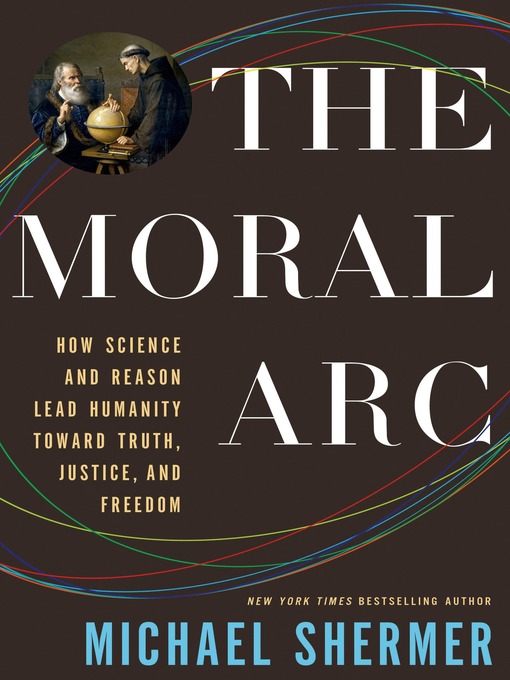
The Moral Arc
How Science Makes Us Better People
فرمت کتاب
ebook
تاریخ انتشار
2015
نویسنده
Michael Shermerناشر
Henry Holt and Co.شابک
9780805096934
کتاب های مرتبط
- اطلاعات
- نقد و بررسی
- دیدگاه کاربران
نقد و بررسی

December 1, 2014
Humanity is creating an increasingly just and equitable world, according to Shermer (Why People Believe Weird Things). He argues that this is occurring in large part because our understanding of the natural world has come to depend on reason and science. Shermer ranges broadly—across such fields as economics, philosophy, politics, and biology—to provide evidence for his thesis. An engaging writer, he offers persuasive data to demonstrate the moral progress that has been made with women’s rights, LGBTQ rights, and animal rights. He also documents the abolition of slavery, the reduction in violence (particularly murder rates), and the decrease in war. Shermer is less successful, however, in demonstrating that a scientific worldview should be seen as the cause for all this, and his polemical outbursts detract from the seriousness of his message. More frustrating are his blinkered views on such matters as income inequality and his omission of rampant ecosystem destruction and an increasing extinction rate in his moral calculus. Essentially an apologia for Shermer’s libertarian politics, there is still ample material here that warrants attention.

November 1, 2014
Skeptic magazine founding publisher Shermer (The Believing Brain: From Ghosts and Gods to Politics and Conspiracies-How We Construct Beliefs and Reinforce Them as Truths, 2011, etc.) reviews the last 400 years of human history to substantiate his claim that it is science and reason, not religion, that reveal a path to "the betterment of humanity in a civilized state.""The economic problems of today are real but tractable...even in the most impoverished places on earth such as Africa," writes the author. Brushing aside concerns about the environment, the accelerated extinction of species, looming resource shortage and political instability, Shermer predicts that by the end of the century, the levels of wealth and prosperity enjoyed in the developed world will be universal. The author believes that developments in our scientific understanding have created the conditions for an upward trend in morality, which he sees as synonymous with the advance of liberal democracies and a global economy. The author rejects the notion that religion has been the "driver of moral progress," citing superstitious practices such as the burning of witches that were sanctioned until the 18th century. Shermer agrees with the defense of science by avowed atheist Richard Dawkins but also recognizes the positive role of religious leaders such as Martin Luther King Jr. and the Dalai Lama in their fight for human betterment. Taking slavery as an example, he attributes its "legal abolition and universal denunciation" to "rational arguments and scientific refutations of slavery," which laid the groundwork for the recognition of the need to protect the rights of blacks, minorities, women, homosexuals and other persecuted groups. Shermer believes that reliance on the scientific method, multiculturalism, the free market and liberal democracy create the conditions necessary for continued progress. A well-documented but perhaps overly optimistic view of a future likely to be challenged by both environmentalists and religious fundamentalists.
COPYRIGHT(2014) Kirkus Reviews, ALL RIGHTS RESERVED.

November 1, 2014
Martin Luther King Jr. said that "the arc of the moral universe is long but it bends toward justice." Shermer (economics, Claremont Graduate Univ.; Why People Believe Weird Things; The Believing Brain; founding publisher, Skeptic magazine; editor, skeptic.com; columnist, Scientific American) discusses why science and reason are the forces behind that drive toward justice. Though religion is often considered the basis of ethics, Shermer convincingly disputes that idea, noting that organized religious communities have been relatively slow to grant civil rights and that the Bible endorses practices condemned today, such as slavery. Shermer raises uncomfortable questions about humanity's relationship with animals, concluding that the latter feel suffering and must be included in the moral arc toward justice, though it may take much time. Other difficult but important topics the author's narrative explores are the Holocaust, psychopathic behavior, and restorative vs. retributive criminal justice. His prediction that women's rights will continue to expand unabated may seem off-putting and glib in light of current struggles. VERDICT Shermer's thought-provoking, multidisciplinary book will engage anyone who wishes to understand rationalism as a force for morality. This volume discusses many dark pages in human history; the sensitive reader may prefer Patricia S. Churchland's Braintrust, which covers the neurobiological aspects of morality.--Laurie Neuerburg, Victoria Coll.-Univ. of Houston Lib.
Copyright 2014 Library Journal, LLC Used with permission.

November 15, 2014
Despite the Twin Towers terrorist attacks and the Rwandan genocide, Shermer discerns moral progress in the last quarter century. Evidence of that progress inheres in statistics limning a global decline of lethal violence and a global proliferation of the rights of women, ethnic minorities, homosexuals, andincreasinglyeven animals. Shermer attributes this progress to the triumph of scientific reasoningand the retreat of religious dogma. To be sure, Shermer is more willing than some New Atheists to recognize that faith can foster volunteerism and generosity. But he still regards piety as a retrograde social influence, incapable of leading the way into an enlightened future. That future, he assures readers, is already unfolding as secular thinkers promulgate a rational morality premised on the principle of interchangeable perspectives, granting special privileges to none but affording equal protection to all. What Shermer calls his protopian theorizing will persuade few who draw their moral precepts from scripture, tradition, or group loyalty. But at a time of widespread cultural ferment, such theorizing will spark keen interest.(Reprinted with permission of Booklist, copyright 2014, American Library Association.)

























دیدگاه کاربران